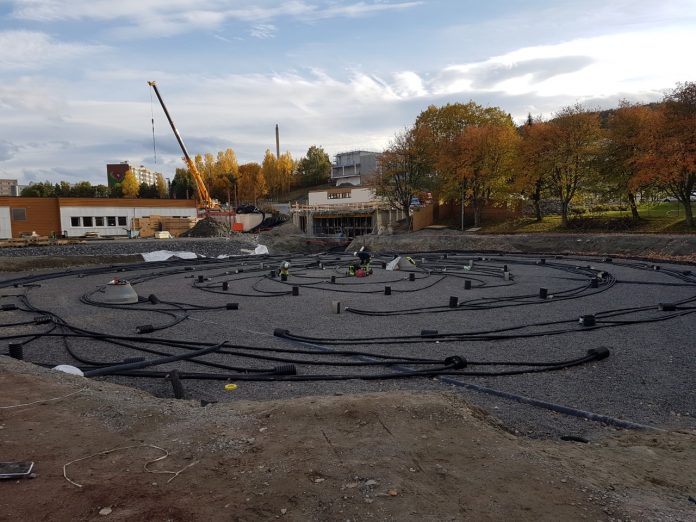Drammen Eiendom KF – a company owned by the municipality of Drammen, Norway – has developed a project to store solar energy as heat. The system can store energy provided by 150 m2 of solar thermal collectors and 1,000 m2 of PV panels in 100 boreholes in granitic gneiss rock, each with a depth of approximately 50 meters.
“GeoTermos is expected to return around 350,000 kWh/year in the form of heat at various temperature levels during the heating season,” said Randi Kalskin Ramstad, a shallow geothermal energy and hydrogeology specialist at the Norwegian University of Science and Technology (NTNU) and engineering services provider Asplan Viak.
The electricity provided by the PV installation produces heat by using air as a heat source for the CO2 heat pump. The heat is then stored in the boreholes during the spring, summer and fall. In the winter, it is used for low-temperature heating in a number of nearby school buildings.
“The system performance of the energy system is quite high,” Kalskin Ramstad told pv magazine. “The operation of the plant has now just started, with heat charging of the boreholes.”
Water is used as a collector fluid in the boreholes, which provides several advantages compared to glycol-based collector liquid, including lower viscosity, better thermal properties, and lower costs. It is also environmentally friendly.
The GeoTermos system – with energy storage, a heat pump, and an accumulation tank – is able to provide approximately 300 kW of heat power for short periods during peak load, and is regulated by the temperature levels and heat power demands.
PV system
The 200 kW PV installation, which was built by local installer Solar Technology Scandinavia SAS, was deployed across four different rooftops at a school. The NOK 3 million ($299,000) system relies on 616 Panasonic VBHN 325 SJ47 PV modules and SolarEdge three-phase SE25K inverters.

The estimated cost of the entire GeoTermos project is approximately NOK 10 million. “But the exact figures are not available, as the project is a part of a procurement and construction contract for a new school at Fjell in Drammen,” Kalskin Ramstad said.
The project is supported by Enova, a state enterprise that finances the development of technologies that contribute to the reduction of greenhouse gases. It is an important test installation for the ongoing RockStore research project, which Asplan Viak and the NTNU are participating in, along with the Norwegian Research Center (NORCE), the Sintef independent research organization, and the Norwegian Energy Regulatory Authority (NVE), among other entities.
“We believe that the GeoTermos system, or adjusted variants of GeoTermos, will be an important piece of the green energy puzzle of the future, where several renewable and volatile energy sources interact as a whole in the energy system,” Kalskin Ramstad said. “To overcome the challenge with seasonal storage of enough energy from periods with excess energy to periods with high peak loads and energy and power shortage, typically in the heating season in Norway.”






